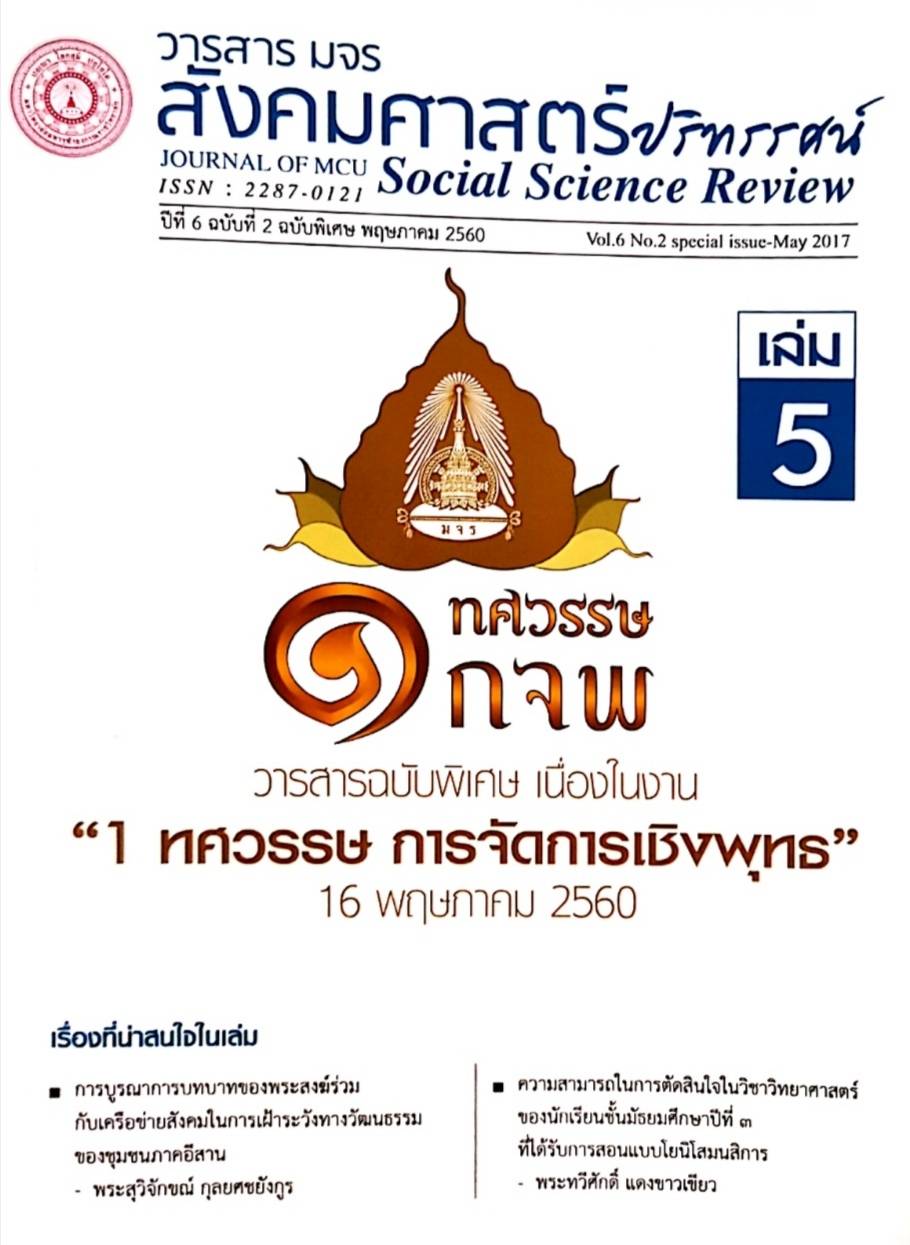การใช้บังคับกฎหมายว่าด้วยอาคารชุด
คำสำคัญ:
กฎหมายอาคารชุด การใช้บังคับบทคัดย่อ
การวิจัยเรื่อง การใช้บังคับกฎหมายว่าด้วยอาคารชุดนี้ มีวัตถุประสงค์เพื่อ (1) ศึกษาลักษณะทั่วไปของอาคารชุด ตั้งแต่ความหมาย ประเภท ความเป็นมา วิวัฒนาการ การถือกรรมสิทธิ์ อาคารชุดกับอาคารประเภทอื่น ตลอดจนเปรียบเทียบกฎหมายอาคารชุดกับกฎหมายการจัดสรรที่ดิน (2) ศึกษาหลักเกณฑ์และมาตรการต่าง ๆ ของกฎหมายอาคารชุด ทั้งของไทยและต่างประเทศ (3) วิเคราะห์ปัญหาการใช้บังคับกฎหมายอาคารชุดและแสวงหาแนวทางการแก้ไขที่มีประสิทธิภาพ และ (4) เสนอแนะแนวทางการแก้ไขปัญหาสาหรับการปรับปรุงและพัฒนากฎหมายอาคารชุดให้เหมาะสมต่อไป การวิจัยนี้เป็นการวิจัยเชิงคุณภาพ โดยการวิจัยเอกสาร ซึ่งจะได้ศึกษาค้นคว้าจากหนังสือ ตำรา เอกสาร บทความ รายงานการวิจัย ประมวลกฎหมาย คาพิพากษาของศาล วิทยานิพนธ์ รายงานการวิจัย ข้อมูลทางสื่ออิเล็กทรอนิกส์ และเครือข่ายอินเตอร์เน็ต และบทบัญญัติที่เกี่ยวข้อง ทั้งของไทยและต่างประเทศ รวมทั้งการรวบรวมข้อมูล ความคิดเห็น และข้อเสนอจากการจัดกลุ่มสัมมนาย่อยเพื่อปรึกษาหารือ โดยมีผู้ทรงคุณวุฒิ นักวิชาการ นักกฎหมาย และผู้ที่เกี่ยวข้องกับธุรกิจอาคารชุดเข้าร่วมสัมมนา ผลการวิจัยพบว่า กฎหมายว่าด้วยอาคารชุดใช้บังคับมาตั้งแต่ปี 2522 แก้ไขปรับปรุงถึง 3 ครั้ง แต่ก็ยังมีปัญหาเป็นอันมาก จึงควรแก้ไขเพิ่มเติมพระราชบัญญัติอาคารชุด พ.ศ. 2522 ในเรื่องการห้ามจดทะเบียนอาคารชุดในอาคารแนวราบ การแก้ไขหลักเกณฑ์การถือกรรมสิทธิ์ในอาคารชุดของคนต่างด้าว การกำหนดให้มีทรัพย์ส่วนกลางเฉพาะส่วนได้ การกำหนดให้มีคณะกรรมการกากับดูแล ได้แก่ คณะกรรมการอาคารชุดกลาง และคณะกรรมการอาคารชุดระดับจังหวัด การกำหนดให้มีมาตรฐานของโครงการ รวมทั้งมาตรการทางสาธารณธูปโภคและบริการสาธารณะ การกำหนดกลไกในการไกล่เกลี่ยและประนอมข้อพิพาท การห้ามละเมิดวัตถุประสงค์ของอาคารชุดและห้องชุด การกำหนดหลักเกณฑ์ให้มีที่จอดรถยนต์ให้เพียงพอ รวมทั้งที่จอดรถยนต์สาหรับคนพิการ การเพิ่มมาตรการคุ้มครองผู้บริโภคตามสัญญาจะซื้อจะขายห้องชุด มาตรการป้องกันการก่อเหตุเดือดร้อนรำคาญจากการเลี้ยงสัตว์ในอาคารชุด มาตรการแก้ไขการค้างชาระค่าส่วนกลางและการบำรุงรักษาทรัพย์ส่วนกลาง การกำหนดให้มีใบอนุญาตประกอบวิชาชีพการจัดการอาคารชุด การแก้ไขปัญหาการไม่เข้าร่วมประชุมและปัญหาเกี่ยวกับการออกเสียงลงคะแนน การ ป้องกันกรณีผลประโยชน์ทับซ้อนและการปฏิบัติหน้าที่โดยทุจริต การแก้ไขปัญหาความเสียหายที่เกิดจากอุปกรณ์หรือสิ่งก่อสร้างที่ชารุดบกพร่องในอาคารชุด รวมทั้งกรณีอาคารชุดเสียหาย การกำหนดมาตรการเพื่อป้องกันอัคคีภัย การกำหนดอายุการใช้อาคารชุด ตลอดจนการแก้ไขหลักเกณฑ์การเลิกอาคารชุดโดยสมัครใจ
เอกสารอ้างอิง
กฎหมายอาคารชุดของสาธารณรัฐฟิลิปปินส์ (Republic Act No. 4726)
กฎหมายอาคารชุดของสาธารณรัฐสังคมนิยมเวียดนาม (Law No. 65/2014/QH) พระราชบัญญัติการจัดสรรที่ดิน พ.ศ. 2543 พระราชบัญญัติอาคารชุด พ.ศ. 2522 Black, Henry. C. (1979).
Black’s Law Dictionary. 5th ed. St. Paul Mium : West Publishing Co. Kehoe, Patrick E. (1974). Cooperatives and Condominiums.
New York: Oceana Publications Ins. Rohan, Patrich J. (1985). Condominium Law and Practice Form, Volume 1, 1 Part 2, 1 Part 3, 1A, 1B, 1B Part 2 and IC. New York : Matthew Bander & Company Incorporated.
ดาวน์โหลด
เผยแพร่แล้ว
รูปแบบการอ้างอิง
ฉบับ
ประเภทบทความ
สัญญาอนุญาต
ลิขสิทธิ์ (c) 2020 วารสาร มจร สังคมศาสตร์ปริทรรศน์

อนุญาตภายใต้เงื่อนไข Creative Commons Attribution-NonCommercial-NoDerivatives 4.0 International License.
เพื่อให้เป็นไปตามกฎหมายลิขสิทธิ์ ผู้นิพนธ์ทุกท่านต้องลงลายมือชื่อในแบบฟอร์มใบมอบลิขสิทธิ์บทความให้แก่วารสารฯ พร้อมกับบทความต้นฉบับที่ได้แก้ไขครั้งสุดท้าย นอกจากนี้ ผู้นิพนธ์ทุกท่านต้องยืนยันว่าบทความต้นฉบับที่ส่งมาตีพิมพ์นั้น ได้ส่งมาตีพิมพ์เฉพาะในวารสาร มจร สังคมศาสตร์ปริทรรศน์ เพียงแห่งเดียวเท่านั้น หากมีการใช้ภาพหรือตารางหรือเนื้อหาอื่นๆ ของผู้นิพนธ์อื่นที่ปรากฏในสิ่งตีพิมพ์อื่นมาแล้ว ผู้นิพนธ์ต้องขออนุญาตเจ้าของลิขสิทธิ์ก่อน พร้อมทั้งแสดงหนังสือที่ได้รับการยินยอมต่อบรรณาธิการ ก่อนที่บทความจะได้รับการตีพิมพ์ หากไม่เป็นไปตามข้อกำหนดเบื้องต้น ทางวารสารจะถอดบทความของท่านออกโดยไม่มีข้อยกเว้นใดๆ ทั้งสิ้น





